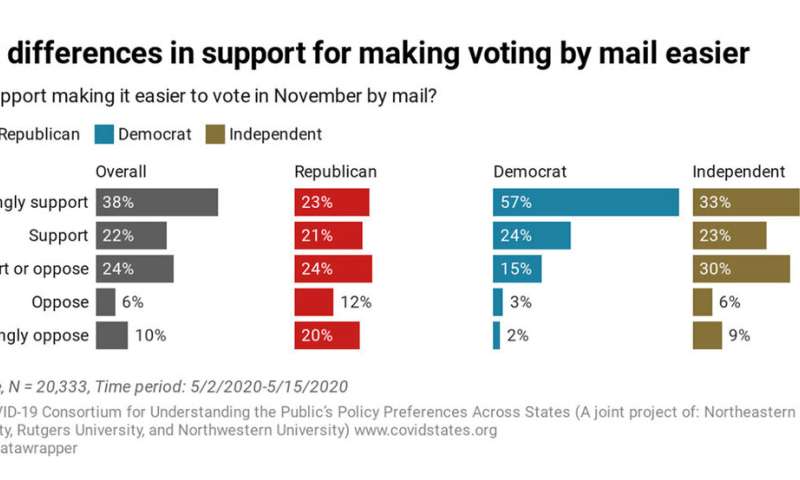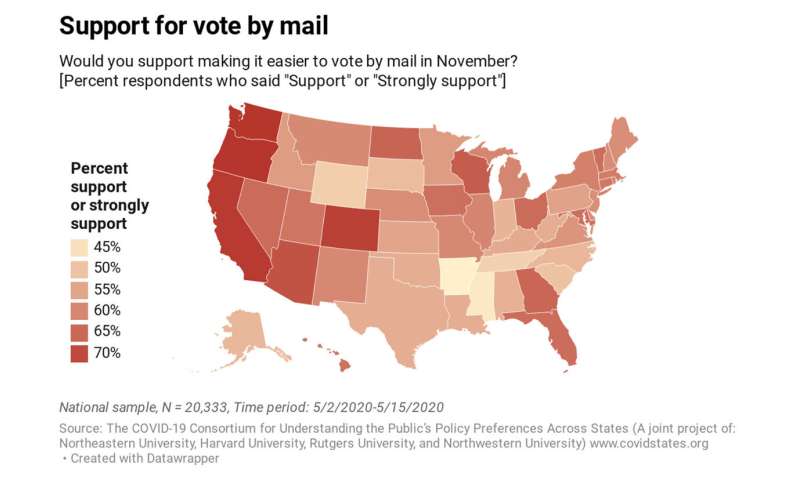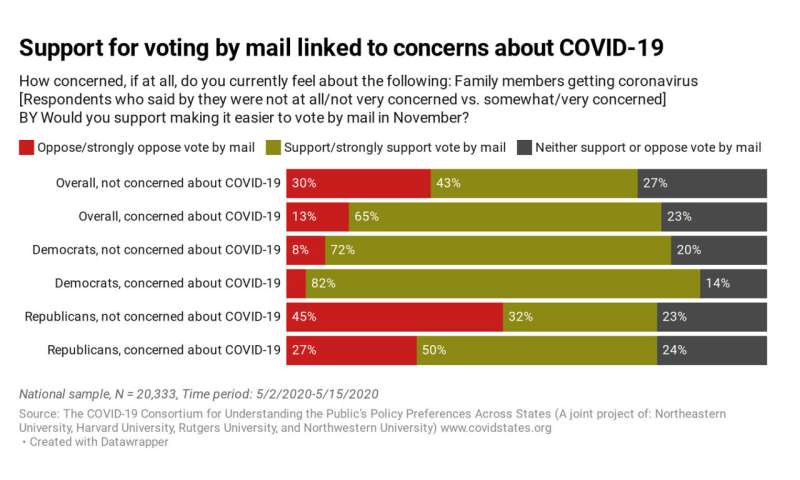A majority in the US supports making mail-in voting easier, new study shows
by Molly Callahan and Laura Castañón
A majority of United States residents supports measures to make it easier to vote by mail, according to new results from a national survey led by researchers from Northeastern, Harvard, Rutgers, and Northwestern universities.
The results, which come at a time when states across the country are planning for what could be a drastically different election in November, show that 60 percent of U.S. residents support making it easier to vote by mail, while 16 percent oppose it, and 24 percent neither support nor oppose it.
"This is a relevant policy issue right now because of COVID-19," says David Lazer, university distinguished professor of political science and computer and information sciences at Northeastern, and one of the researchers who conducted the study. "The concern is that maybe showing up and waiting in line and in crowded rooms with lots of people in November is not going to be a very good thing to do. So clearly, this is something that is under active consideration in many places."
Researchers surveyed 20,333 people across all 50 states and the District of Columbia between May 2 and May 15, and found stark regional differences in support for efforts to make mail-in voting easier.
They found that majorities of U.S. residents supported making mail-in voting easier in all but four states—Arkansas, Mississippi, Tennessee, and Wyoming. At the other extreme, there were four states (and the District of Columbia) in which more than 70 percent of residents supported such efforts—California, Delaware, Hawaii, and Iowa.
Every state in the U.S. already offers absentee voting for residents who are unable to go to their assigned polling places on Election Day. Five states—Colorado, Hawaii, Oregon, Washington, and Utah—conduct elections entirely by mail, and an additional 16 allow certain local elections to be held by mail, according to the survey.
Mail-in voting, also called absentee balloting, is likely to be an essential component of holding a national election during a pandemic for which public health guidelines would prevent mass gatherings to vote in person.

"We don't know where we'll be in November," Lazer says. "We need to be allocating funds for this, we need to do planning and logistics, and we need to be doing that now."
Concerns about contracting the virus or the disease it causes appear to influence U.S. residents' support for mail-in voting, the survey shows. Sixty-seven percent of people who reported that they were "somewhat" or "very" concerned about contracting COVID-19 supported voting by mail, compared to 48 percent of people who didn't share their concerns.
"People who are concerned about COVID-19 are also more likely to support vote-by-mail," Lazer says. "You can see a strong correlation in the data."
The results were almost identical when people were concerned that a family member, not themselves, would become ill. Sixty-five percent of people who were worried that a family member would contract COVID-19 supported mail-in voting, while 43 percent of people who weren't concerned supported it.
The influence that people's concern for their own wellbeing or that of a family member had over their support for voting by mail transcended partisan politics.
"We see that across partisanship," Lazer says. "Republicans who are more concerned about COVID-19 are more supportive of vote-by-mail as well."
Researchers found that 82 percent of Democrats and 50 percent of Republicans who were concerned about the health of their family supported voting by mail. The results show a slight increase from baseline attitudes of Democrats and Republicans: Broadly, 80 percent of Democrats and 45 percent of Republicans support such measures.

Still, the results show that a clear partisan divide exists, and it persists when the researchers probed the respondents' ideological differences in alternative ways, as well.
Sixty-four percent of U.S. residents who said they trust their city government to handle the COVID-19 pandemic supported making mail-in voting easier, compared to 46 percent of people who said they didn't trust their government.
But this trend reversed when it came to the White House.
Only 46 percent of people who said they trust President Donald J. Trump, who has openly opposed absentee balloting, supported voting by mail, while 73 percent of people who said they didn't trust the president supported it.
Still, the researchers found that measures to enable people to vote by mail could inspire more people to vote in November. They found that more than a third (36 percent) of adults surveyed would be more likely to vote if they had the option to vote for president by mail.
"You can see this conjunction of concern about the health risks of voting in person as being something that would really deter some people from voting," Lazer says. "Our data suggests that voting by mail might enable some people to vote who would otherwise not."
Provided by Northeastern University